|
Books Should Be Free Loyal Books Free Public Domain Audiobooks & eBook Downloads |
|
|
Books Should Be Free Loyal Books Free Public Domain Audiobooks & eBook Downloads |
|
Science |
|---|
|
Book type:
Sort by:
View by:
|
By: Roald Amundsen (1872-1928) | |
|---|---|
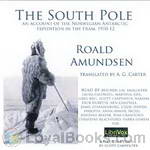 The South Pole; an account of the Norwegian Antarctic expedition in the Fram, 1910-12
The South Pole; an account of the Norwegian Antarctic expedition in the Fram, 1910-12
In contrast to Scott’s South Pole expedition, Amundsen’s expedition benefited from good equipment, appropriate clothing, and a fundamentally different primary task (Amundsen did no surveying on his route south and is known to have taken only two photographs) Amundsen had a better understanding of dogs and their handling, and he used of skis more effectively. He pioneered an entirely new route to the Pole and they returned. In Amundsen’s own words: “Victory awaits him who has everything in order — luck, people call it... | |
By: Robert J. Braidwood (1907-2003) | |
|---|---|
 Prehistoric Men
Prehistoric Men
This little book, first published in 1948, is part of the Chicago Natural History Popular History series that explains difficult subjects in ways and terms we all can understand. It was published at a time in Anthropology when exciting things like carbon dating were first being used and refined. "Prehistory means the time before written history began. Actually, more than 99 per cent of man’s story is prehistory. Man is at least half a million years old, but he did not begin to write history until about 5,000 years ago... | |
By: Robert Armitage Sterndale | |
|---|---|
 Natural History of the Mammalia of India and Ceylon
Natural History of the Mammalia of India and Ceylon
NATURAL HISTORY OF THE MAMMALIA OF INDIA AND CEYLON.By Robert A. Sterndale, F.R.G.S., F.Z.S., &C., PREFACE. This work is designed to meet an existing want, viz.: a popular manual of Indian Mammalia. At present the only work of the kind is one which treats exclusively of the Peninsula of India, and which consequently omits the more interesting types found in Assam, Burmah, and Ceylon, as well as the countries bordering the British Indian Empire on the North. The geographical limits of the present work have been extended to all territories likely to be reached by the sportsman from India, thus greatly enlarging the field of its usefulness... | |
By: Robert Bloch | |
|---|---|
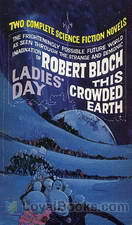 This Crowded Earth
This Crowded Earth
Robert Bloch was a prolific writer in many genres. As a young man he was encouraged by his mentor H. P. Lovecraft, and was a close friend of Stanley G. Weinbaum. Besides hundreds of short stories and novels he wrote a number of television and film scripts including several for the original Star Trek. In 1959 Bloch wrote the novel Psycho which Alfred Hitchcock adapted to film a year later. He received the Hugo Award, the World Fantasy Award, the Bram Stoker Award, and he is a past president of the Mystery Writers of America. Published in Amazing Stories in 1958, This Crowded Earth is a thriller set on an overpopulated Earth of the future. | |
By: Robert Burton (1577-1640) | |
|---|---|
 Anatomy of Melancholy Volume 3
Anatomy of Melancholy Volume 3
The Anatomy of Melancholy is a book by Robert Burton, first published in 1621. On its surface, the book is a medical textbook in which Burton applies his large and varied learning in the scholastic manner to the subject of melancholia (which includes what is now termed clinical depression). Though presented as a medical text, The Anatomy of Melancholy is as much a sui generis work of literature as it is a scientific or philosophical text, and Burton addresses far more than his stated subject. In... | |
By: Robert Falcon Scott (1868-1912) | |
|---|---|
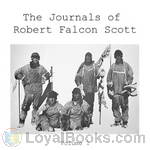 The Journals of Robert Falcon Scott
The Journals of Robert Falcon Scott
Capt. Robert F. Scott's bid to be the leader of the first expedition to reach the South Pole is one of the most famous journeys of all time. What started as a scientific expedition turned out to be an unwilling race against a team lead by R. Admunsen to reach the Pole. The Norwegian flag already stood at the end of the trail when Scott's party reached their target. All the five men of the Scott expedition who took part in the last march to the Pole perished on their way back to safety. Robert F. Scott kept a journal throughout the journey, all the way to the tragic end, documenting all aspects of the expedition... | |
By: Robert Goadby (1721-1778) | |
|---|---|
 Surprising Adventures of Bampfylde Moore Carew, King of the Beggars
Surprising Adventures of Bampfylde Moore Carew, King of the Beggars
The Surprising Adventures of Bampfylde Moore Carew recounts the wide-ranging exploits of a real-life rogue – a wily professional mendicant who roams 18th-century England extracting charity from merchants, clergyman, and members of the landed gentry alike, employing in his craft an ingenious variety of deceptions and disguises put on for the purpose. Often he impersonates a shipwreck-surviving seaman and uses his wide knowledge of foreign parts and personages to achieve plausibility. Or he might appear on a doorstep as a destitute woman in widow's weeds, toting borrowed babes to enhance the effect... | |
By: Robert Hugh Benson (1871-1914) | |
|---|---|
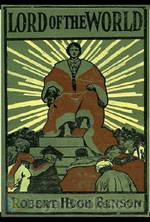 Lord of the World
Lord of the World
“Mr. Benson sees the world, four or five generations hence, free at last from all minor quarrels, and ranged against itself in two camps, Humanitarianism for those who believe in no divinity but that of man, Catholicism for those who believe in no divinity but that of God.” This apocalyptic novel from the early 1900's is sometimes deemed one of the first modern dystopias. | |
By: Robert Millikan (1868-1953) | |
|---|---|
 On the Elementary Electrical Charge
On the Elementary Electrical Charge
The experiments herewith reported were undertaken with the view of introducing certain improvements into the oil-drop method of determining e and N and thus obtaining a higher accuracy than had before been possible in the evaluation of these most fundamental constants. From the Physical Review, Vol. II, No. 2 | |
By: Robert N Bader | |
|---|---|
 Amphibians and Reptiles in Captivity
Amphibians and Reptiles in Captivity
In recent years the number of people interested in keeping amphibians and reptiles in captivity has grown rapidly. All too often, these same people have little knowledge of the proper care needed for their captives, nor do they know where to turn in order to learn the needs of their animals. It is the intent of the authors of this special issue to offer the proper information needed to successfully keep amphibians and reptiles in captivity. We are by no means THE experts on the subject, nor do we claim to cover all the facts. However, we do hope that enough information is furnished to answer most of the common questions asked by people. - Summary by Tom R. Johnson | |
By: Robert Sheckley (1928-2005) | |
|---|---|
 The Status Civilization
The Status Civilization
Will Barrent awakes without memories just before being deposited on Omega, a planet for criminals where the average life expectancy is 3 years. He’s listed as a murderer and released into the illicit society as a “peon” the lowest class imaginable. A mysterious girl gives him a weapon that starts him on his path to status, a path that requires constant brutality. But it must be borne if our hero is to discover the reason for his imprisonment; A reason that pits him against himself, and involves the sardonically similar but devoutly different creeds of Omega and Earth... | |
 Watchbird
Watchbird
3 Robert Sheckley short stories that demonstrate the breathof his fantastic imagination. In Watchbird, the question "can machines solve human problems?" is answered with a resounding YES! But there may be a few unforeseen glitches. Just a few. Warrior Race drops us into an alien race of warriors who fight in a way you will never be able to imagine until you listen. And Beside Still Waters is a gentle story that shows us a man who really wants to get away from it all ... sitting on a rock in the asteroid belt with only a robot for a friend. No girls allowed! A poignant and unsettling story to say the least. | |
By: Robert Silverberg (1935-) | |
|---|---|
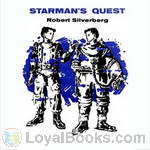 Starman's Quest
Starman's Quest
Travelling at speeds close to that of light, spacemen lived at an accelerated pace. When one of the twin boys left the starship, he grew older while his twin in space barely aged. So the starship twin left the ship to find what happened to his brother who was aging away on earth. | |
 Happy Unfortunate
Happy Unfortunate
Here are two early stories by the well known SF Author Robert Silverberg. The Happy Unfortunate was published first in Amazing Stories in 1957 and explores the angst caused when the human race reaches into space but at the cost of needing to breed a new species; specialized 'spacers' who can withstand the tremendous rigors of acceleration. The Hunted Heroes was published in Amazing stories a year earlier, in 1956. It is a futuristic story that holds great hope for the resilience of the human race after the war destroys most of the world. | |
By: Robert Silverberg and Randall Garrett (1935-) | |
|---|---|
 The Judas Valley
The Judas Valley
Why did everybody step off the ship in this strange valley and promptly drop dead? How could a well-equipped corps of tough spacemen become a field of rotting skeletons in this quiet world of peace and contentment? It was a mystery Peter and Sherri had to solve. If they could live long enough! [from the Judas Valley]Originally published in Amazing Stories, October 1956 | |
By: Robert Stawell Ball (1840-1913) | |
|---|---|
 Great Astronomers
Great Astronomers
Of all the natural sciences there is not one which offers such sublime objects to the attention of the inquirer as does the science of astronomy. From the earliest ages the study of the stars has exercised the same fascination as it possesses at the present day. Among the most primitive peoples, the movements of the sun, the moon, and the stars commanded attention from their supposed influence on human affairs. From the days of Hipparchus down to the present hour the science of astronomy has steadily grown... | |
By: Robert Sterling Yard (1861-1945) | |
|---|---|
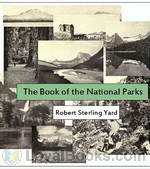 The Book of the National Parks
The Book of the National Parks
Robert Sterling Yard (February 1, 1861 – May 17, 1945) was an American writer, journalist, and wilderness activist. Born in Haverstraw, New York, Yard graduated from Princeton University and spent the first twenty years of his career in the editing and publishing business. In 1915, he was recruited by his friend Stephen Mather to help publicize the need for an independent national park agency. Their numerous publications were part of a movement that resulted in legislative support for a National Park Service (NPS) in 1916... | |
By: Robert Williams Wood (1868-1955) | |
|---|---|
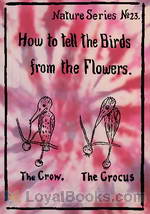 How to Tell the Birds from the Flowers
How to Tell the Birds from the Flowers
How do you tell apart a parrot from a carrot? A plover from a clover? A bay from a jay? Although there are several ways of differentiating, R. W. Wood’s use of pun and rhyme is one of the most entertaining! | |
By: Roger North (1653-1734) | |
|---|---|
 History of Esculent Fish
History of Esculent Fish
Roger North, son of Dudley North, 4th Baron North, was a successful member of the bar and later member of parliament. But he had wide ranging interests from architecture to music. He has an avid collector of books and is best known as the biographer of the North family. Here we sample his interest in raising fish. He presents fifteen short sketches of esculent fish, and a longer essay as "A Discourse of Fish and Fish Ponds." - Summary by Larry Wilson | |
By: Rupert H. Wheldon (1883-) | |
|---|---|
 No Animal Food and Nutrition and Diet with Vegetable Recipes
No Animal Food and Nutrition and Diet with Vegetable Recipes
Though little is known about its author, this is considered the first vegan cookbook ever written. At the time of its composition, the Vegetarian Society and other advocates of vegetarian diets were engaged in a debate about the inclusion of dairy and eggs in one's regime. This text declares, from the title to the footnotes, that the best diet is free from all animal products. The arguments span historical, physical, ethical, aesthetic, and economic considerations and conclude with practical advice that stands the test of time. An essential text for those interested in vegetarianism and animal rights. | |
By: Russel Doubleday (1872-1949) | |
|---|---|
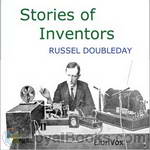 Stories of Inventors
Stories of Inventors
Doubleday chronicles the history of everyday inventions that form the foundation of technology now common through the world. While some of the inventions are no longer used, each example shows how inventors contributed to technology through perseverance, inspiration and clever observations. In each chapter, he gives a clear, understandable background of the technology.Many of the now outdated inventions may have inspired later inventions by meeting emerging demands. For example, Edison's filament bulb is now being phased out by more efficient CFL's, but Edison's contribution to indoor lighting likewise removed the need for inefficient gas-burning lamps... | |
By: S. Louise Patteson (1853-1922) | |
|---|---|
 How To Have Bird Neighbors
How To Have Bird Neighbors
The author provides the listener with anecdotes from her life of her experiences with birds. She describes their habits and antics, their food favorites, their preferred nesting practices, and what can be done to encourage birds to become "neighbors". She also provides instructions on making a birdhouse. | |
By: Samuel Phillips Day | |
|---|---|
 Tea: Its Mystery and History
Tea: Its Mystery and History
Samuel Phillips Day traces the history of tea from Asia to England, exploring some of the romance of this treasured drink and its place in British culture. - Summary by Larry Wilson | |
By: Selina Gaye (1840-1914) | |
|---|---|
 The World's Lumber Room
The World's Lumber Room
If this book were written today, it would be called "The Story of the World's Rubbish".That may not sound a promising subject for a book, but we are taken on a journey all over the world (and beyond) to explain the many varieties of dust and refuse - animal, vegetable and mineral - how it is made both by man and by nature, what happens to it, and why we need it. We find that recycling is nothing new: man has been doing it for centuries, and nature has been doing it for billions of years. As every schoolboy knows, 'matter is neither created nor destroyed', so it stands to reason that every particle of it must be somewhere... | |
By: Sextus Julius Frontinus (40-103) | |
|---|---|
 Stratagems and The Aqueducts of Rome
Stratagems and The Aqueducts of Rome
Frontinus' Stratagems is a collection of examples of military stratagems from Greek and Roman history, which the author comments based on his own experience as a general in Germania. Many of the stories he tells can also be found in other Roman authors like Valerius Maximus and Livy. His most famous work however is De aquaeductu, The Aqueducts of Rome, an official report to the emperor on the state of the aqueducts of Rome, in two books. It presents a history and description of all the nine aqueducts that provided the water-supply of Rome in the first century, as well as information about the laws relating to its use and maintenance, and the quality of water delivered by each. | |
By: Sigmund Freud (1856-1939) | |
|---|---|
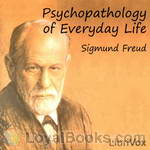 Psychopathology of Everyday Life
Psychopathology of Everyday Life
Professor Freud developed his system of psychoanalysis while studying the so-called borderline cases of mental diseases, such as hysteria and compulsion neurosis. By discarding the old methods of treatment and strictly applying himself to a study of the patient's life he discovered that the hitherto puzzling symptoms had a definite meaning, and that there was nothing arbitrary in any morbid manifestation. Psychoanalysis always showed that they referred to some definite problem or conflict of the person concerned... | |
By: Sir Arthur Conan Doyle (1859-1930) | |
|---|---|
 Danger! and Other Stories
Danger! and Other Stories
This is a volume of short stories by the famous Arthur Conan Doyle. | |
By: Sir Charles Bright (1863-1937) | |
|---|---|
 Story of the Atlantic Cable
Story of the Atlantic Cable
The electric telegraph, together with the railway-train and the steamship, constituted the three most conspicuous features of late 19th century civilization. Indeed, it may be truly said that the harnessing electricity to the service of man for human communication has effected a change in political, commercial, and social relations, even more complete than that wrought by steam locomotion. This is the story of how the electric telegraph cable was laid across the floor of the Atlantic from Newfoundland to Ireland. - Summary by modified from the introduction | |
By: Sir Francis Galton (1822-1911) | |
|---|---|
 Hereditary Genius
Hereditary Genius
A biographical summary of the pre-eminent men of Britain grouped by profession. The extensive survey draws from information including college graduation, reputation during career, fellowships, and even known relatives. Includes discussions on findings and observations as well as referenced appendices. - Summary by Leon Harvey | |
 Inquiries into Human Faculty and its Development
Inquiries into Human Faculty and its Development
Francis Galton, credited with the discovery of identification by fingerprinting, also took a long term interest in the study of biometrics. In this book, many different faculties, both observable and measurable are discussed in length and methods of collecting data suggested. In addition, casual observations from personal memoirs, and drawing similar cases from other reputable sources are also compared. A wide variety of topics are mentioned, including differences in appearance within family members, to subtle habits and emotional responses comparing humans and animals are mentioned in a series of chapter length essays. - Summary by Leon Harvey | |
By: Sir Thomas Edward Thorpe (1845-1925) | |
|---|---|
 History of Chemistry, Volume II. From 1850-1910
History of Chemistry, Volume II. From 1850-1910
A history of the advances in chemistry, in the fields of inorganic, organic and physical chemistry from the mid-nineteenth century through the early 1900s. Included are brief biographical sketches of some early pioneers in the field such as Mendeleev, Liebeg, Williamson, Dewar and others. Chapters covering the discovery of new elements, the developing understanding of structure, properties and reactivity, the beginnings of practical organic synthesis and the early work on stereoisomerism show how the way was paved for the discoveries that followed in the 20th century... | |
By: Sir William Henry Bragg (1862-1942) | |
|---|---|
 World of Sound
World of Sound
The World of Sound consists of six lectures delivered before a juvenile audience at the Royal Institution, Christmas 1919. The Royal Institution Christmas Lectures are a series of lectures on a single topic, which have been held at the Royal Institution in London each year since 1825, except several years during the Second World War. The lectures present scientific subjects to a general audience, including young people, in an informative and entertaining manner. Michael Faraday initiated the first Christmas Lecture series in 1825, at a time when organised education for young people was scarce... | |